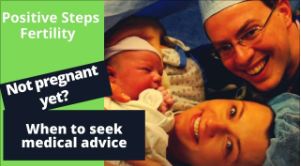You’re doing everything right — tracking when you ovulate, eating well, exercising in moderation, and managing stress. The ovulation tests are turning positive each month. But still… no baby.
It’s one of the most common and frustrating situations I see in my practice. And the truth is: Yes, you can ovulate and still not get pregnant. Ovulation is necessary — but not sufficient — for conception.
If you’ve been trying and wondering what’s missing, this article is for you.
Why Ovulation Alone Might Not Lead to Pregnancy
When you ovulate it means your ovary is releasing a mature egg — and that’s a critical first step. But it’s only one piece of the puzzle. Just because you are able to ovulate, it doesn’t mean pregnancy will follow.
Here’s what else needs to go right for conception to occur:
- Healthy sperm must be present — Just because an egg is released doesn’t mean it’s viable. Egg quality naturally declines with age, and some eggs may carry genetic abnormalities that prevent fertilization or healthy development. Similarly, sperm may reach the egg but fail to fertilize it due to low motility, poor morphology (shape), or DNA fragmentation.
- Fallopian tubes must be open and functional — The fallopian tubes are the meeting place for the egg and sperm — so if they’re blocked or damaged, fertilization can’t occur. These blockages may be caused by conditions like pelvic inflammatory disease (PID), endometriosis, or scar tissue from previous surgeries. In some cases, even a partial blockage can disrupt the journey of the egg or embryo.
- The uterine lining must be receptive — A fertilized egg needs a supportive environment to implant and grow. If the uterine lining is too thin or hormonally unprepared, implantation may not occur. Causes can include hormonal imbalances, low estrogen levels, or damage from previous uterine surgeries or infections.
- Hormones must be balanced — Hormonal balance is essential for supporting early pregnancy. From ovulation to implantation and beyond, hormones like progesterone help create and maintain the right environment. If progesterone or other hormones are off, early pregnancy can falter.
- The egg must be genetically viable — Finally, the egg itself needs to be healthy and capable of developing properly after fertilization. Not all eggs are equal. Some may have chromosomal issues that prevent normal fertilization or development. Even with everything else in place, an abnormal egg can lead to failed conception or early loss.
This is why you can ovulate like clockwork and still struggle to conceive. Ovulation is necessary, but it’s not the full picture.
5 Reasons You May Not Be Getting Pregnant Despite Ovulating
If you ovulate regularly but still get a negative pregnancy test, some issues may be affecting your fertility.
1. Blocked or Damaged Fallopian Tubes
Sperm and egg typically meet in the fallopian tube. If one or both tubes are blocked — due to pelvic inflammatory disease (PID), endometriosis, scar tissue, or prior surgery — fertilization may never occur.
2. Endometriosis
This often underdiagnosed condition can cause inflammation, pelvic adhesions, and distorted anatomy — all of which can interfere with fertility, even when ovulation is happening normally.
3. Poor Egg or Sperm Quality
Eggs may be released but lack the quality to be fertilized or develop into a healthy embryo. Sperm might reach the egg but fail to fertilize due to poor motility, abnormal shape, or DNA fragmentation.
4. Thin or Unreceptive Uterine Lining
Even if fertilization occurs, the embryo needs a healthy uterine lining to implant. A thin or hormonally unprepared lining — sometimes caused by low estrogen or past uterine surgery — can prevent pregnancy.
5. Unexplained Infertility
Sometimes, all standard fertility tests show normal results. You may be ovulating, your partner’s sperm may be healthy, and your tubes may be open. Still, pregnancy might not happen. While it can be frustrating, this doesn’t mean there’s no cause. It just means it hasn’t yet been identified. More advanced diagnostics (like our Parryscope Fertility Diagnostic Test) often reveal the missing piece.
Can You Still Be Infertile If You Ovulate?
Absolutely. It happens all the time.
Infertility is defined as the inability to get pregnant after 12 months of regular, unprotected sex (or 6 months if you’re over 35). And yes — you can meet that definition while ovulating monthly.
According to the CDC, roughly 1 in 5 women between ages 15–49 with no prior births are unable to get pregnant after one year of trying. If that’s you, you’re not alone — and it’s not something to ignore.
How to Know If Ovulation Isn’t Enough
Even if ovulation tests are positive, there may be deeper factors at play. Pay attention to these signs:
- Irregular cycles — If your periods vary in length or timing, it may signal inconsistent hormone patterns or ovulatory quality.
- You’ve been trying for over 6–12 months — If you’re over 35 and have tried for six months or more, or under 35 and trying for over a year, it’s time for a full fertility workup.
- You have a history of conditions like PCOS, PID, endometriosis, or uterine surgery — All of these may impact fertility in ways ovulation kits can’t detect.
What Is the Parryscope Test — And How Can It Help?
If you are ovulating but not getting pregnant, it’s time to explore further. The Parryscope Fertility Diagnostic Test was made for this purpose.
This breakthrough 20-minute test evaluates the three core components of female fertility in one gentle, efficient visit — without anesthesia or recovery time:
- Ovarian Reserve — How many high-quality eggs do you have?
- Fallopian Tube Patency — Are your tubes open and functional?
- Uterine Readiness — Is your uterus prepared for implantation?
Just as important as the test itself is our comprehensive discussion of results during the same appointment. The Parryscope fertility test provides same-day results in simple language. It helps each patient understand her fertility issues and the best treatment options to achieve pregnancy.
How to Improve Fertility When You’re Already Ovulating
If ovulation is happening but pregnancy isn’t, here’s what you can do to optimize your chances:
1. Track Your LH Surge to Pinpoint Your Fertile Window
Ovulation predictor kits (OPKs) measure the luteinizing hormone (LH) surge that happens 24–36 hours before ovulation. Using OPKs can help you time intercourse during your most fertile days — which often means a narrow 2–3 day window each cycle.
2. Time Sex Before You Ovulate, Not After
Many people assume that having sex on the day of ovulation is ideal, but actually, sperm needs to be waiting in the fallopian tubes before the egg is released. The best time for intercourse is 1–2 days before ovulation. Since sperm can live up to 5 days, but the egg only survives 12–24 hours, earlier timing gives you the best shot.
3. Nurture Sperm Health
Sperm quality is just as important as egg health. To help boost sperm count and motility, encourage your partner to:
- Avoid hot tubs or saunas (excess heat can harm sperm production)
- Skip tight underwear in favor of looser-fitting options.
- Quit smoking and limit alcohol.
- Eat a nutrient-rich diet and stay active
4. Maintain a Healthy Weight and Reduce Stress
Hormonal balance is sensitive to stress and body weight. Both underweight and overweight bodies can experience irregular ovulation or implantation challenges. Gentle exercise, a nourishing diet, and stress-reduction techniques like yoga or meditation can help keep hormones in sync.
5. Watch Your Caffeine and Alcohol Intake
High levels of caffeine and alcohol can interfere with hormone levels and egg quality. Most experts recommend limiting caffeine to under 200 mg per day (about one 12-ounce cup of coffee) and minimizing alcohol when you’re actively trying to conceive.
6. Support Egg Quality with Lifestyle Tweaks
Egg quality naturally declines with age, but certain lifestyle habits may help support it:
- Get enough sleep (7–9 hours per night)
- Take high-quality prenatal vitamins with folate and antioxidants.
- Eat foods rich in vitamins C, E, and omega-3s
7. Have Your Partner Consider a Semen Analysis
If you’ve been trying for several months with no success, a semen analysis can be incredibly revealing. It’s simple, fast, and can quickly rule out (or identify) male-factor issues that may be contributing to fertility struggles.
Signs of Poor Egg Quality When Trying to Conceive
When you’re trying to conceive, egg quality is a major piece of the puzzle — but it’s also one of the hardest to evaluate on your own. Unlike some health conditions that come with clear, physical symptoms, poor egg quality often shows no outward signs at all. That means many people don’t realize there’s an issue until they start trying to get pregnant or undergo fertility testing.
Poor egg quality often doesn’t cause symptoms, but here are signs that may point in that direction:
1. Shorter or Irregular Menstrual Cycles
A consistent shift in cycle length — especially if your cycles start to shorten (less than 24 days) — could be a subtle sign of changing hormone levels and declining egg quality. Irregular cycles can also suggest that when you ovulate is inconsistent or issues with egg maturation, both of which can affect fertility.
2. Low AMH or High FSH on Blood Tests
Two key hormone tests can provide insight into your ovarian reserve:
- AMH (Anti-Müllerian Hormone): Low AMH levels may indicate a reduced number of remaining eggs, which often correlates with declining quality.
- FSH (Follicle-Stimulating Hormone): High FSH levels (especially on day 3 of your cycle) can mean your body is working harder to stimulate the ovaries, which can be a sign that egg quality or quantity is compromised.
These tests don’t measure quality directly, but they offer important clues about how well your ovaries are functioning.
3. Poor Embryo Development in IVF
For those undergoing fertility treatments like IVF, poor egg quality may become more obvious in the lab. Eggs that don’t fertilize properly, embryos that stop developing, or lower rates of implantation often point to challenges with egg quality. If embryos repeatedly fail to reach the blastocyst stage, this could be a red flag.
4. Advanced Maternal Age (Especially After Age 35)
Age is one of the biggest and most well-documented factors influencing egg quality. Women are born with all the eggs they’ll ever have, and over time, both the number and quality of those eggs naturally decline. After age 35, this decline tends to accelerate, which is why age-related infertility becomes more common in the mid-to-late 30s and beyond.
This doesn’t mean pregnancy is impossible after 35, but it often becomes more challenging, and egg quality is a big part of that picture.
5. A Short Luteal Phase
The luteal phase is the window between ovulation and your next period — the time when your body prepares to support a pregnancy. A consistently short luteal phase (usually less than 10 days) may be a sign of insufficient progesterone or disrupted hormone signaling. That can impact implantation and early pregnancy — and may also reflect issues with the quality of the egg that was released.
Why Your Ovulation Test Might Be Negative — And What That Means
A missing LH surge on an ovulation test doesn’t always mean you’re not ovulating. Consider:
- Your LH surge may be brief and easy to miss
- You might be testing at the wrong time of day
- You may have anovulatory cycles (especially with PCOS)
- Thyroid dysfunction or elevated prolactin could be suppressing ovulation
At Positive Steps, we are here to help and answer your questions. We can check if you are ovulating normally. We can also see if your cycle supports conception.
What To Do If You’re Ovulating But Still Not Getting Pregnant
If you’re ovulating but not getting pregnant, the next step is gaining a clearer understanding of all the other factors that impact fertility.
You don’t have to navigate this alone. And you don’t need months of trial and error to uncover what’s going on. The answers are often closer — and simpler — than you think.
Final Thought
If you’re frustrated or confused about why pregnancy isn’t happening — even though the ovulation tests are positive — trust your instincts. Something may be off, and it’s worth exploring.
Let’s find out what’s really happening. With clarity, compassion, and a plan, we can help you move forward — informed and empowered.
Next Steps You Can Take
At Positive Steps Fertility, my goal is to give women clear, evidence-based answers so they can make informed decisions. If you’re worried about your fertility, call us today, and we’ll help you understand the complete picture of your fertility and your options for the future.
- Learn more about Why I Can’t Get Pregnant.
- Watch my YouTube Video on Ovulating But Not Getting Pregnant.
- Sign up for our 20-minute fertility diagnostic test, the Parryscope Test, invented by Dr. Parry.
If you’re ready for answers now, schedule a consultation with our team. Don’t suffer in silence. Find answers. Find peace. Reach out today




